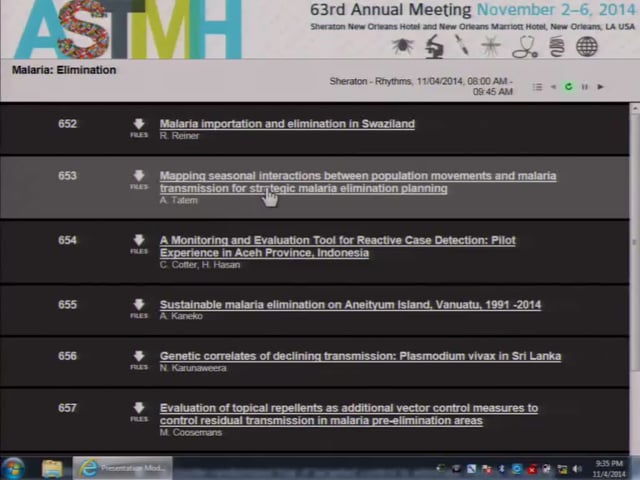ASTMH 2014, Chris Cotter: “A monitoring and evaluation tool for reactive case detection: Pilot experience in Aceh Province, Indonesia”
Collaborator(s): University of California San Francisco (UCSF), United States; United Nations Children’s Fund (UNICEF), United States
Countries: Indonesia
Published: 01/11/2014
In collaboration with ASTMH, ImageAV & presenters, MESA brings you this webcast.
Title: A monitoring and evaluation tool for reactive case detection: Pilot experience in Aceh Province, Indonesia’
Abstract:
This talk forms part of the Scientific Session on ‘Malaria Elimination’ at ASTMH. Active case detection (ACD) strategies are recommended by the World Health Organization and are implemented in many low transmission settings worldwide as a critical part of malaria elimination programs. ACD strategies include determining the origin of infection, case investigation, and responding to locally acquired cases of malaria, known as reactive case detection (RACD). Effectively implementing RACD requires substantial programmatic and human resources. Aceh Province has a goal to eliminate malaria by 2015. Between June and September 2013, a pilot was conducted to evaluate RACD activities and identify best practices to inform RACD efforts in Aceh Province. Using a standardized monitoring and evaluation (M&E) tool, a sample of 5 districts including 34 health facilities were evaluated to measure RACD indicators, in addition to staff interviews regarding RACD procedures. To measure case investigation and RACD rates and timeliness, quantitative data was extracted from the district health offices and health facility registers and measured against defined indicators. Questionnaires were administered to 59 health facility staff involved in conducting RACD. From January to December 2012, a total of 289 cases (range 0 to 153) were reported at health facilities with a completeness of 92% when compared with the district health office records. Mean case investigation rates were 78% (range from 62 to 100). Screening by microscopy was conducted on a total of 931 community individuals (16.3 individuals per index case) with 3 new infections identified. Mean timeliness of RACD conducted within 7 days was 82% (range from 43 to 100). These findings indicate the need for improved patient data collection upon presentation at the health facility, and for staff to visit index cases after normal work hours to prevent loss due to follow up during case investigations. Rollout of the M&E tool to additional districts in Aceh Province and the monitoring of currently sampled districts will improve timeliness and reporting completeness of facilities and optimize RACD program effectiveness.



